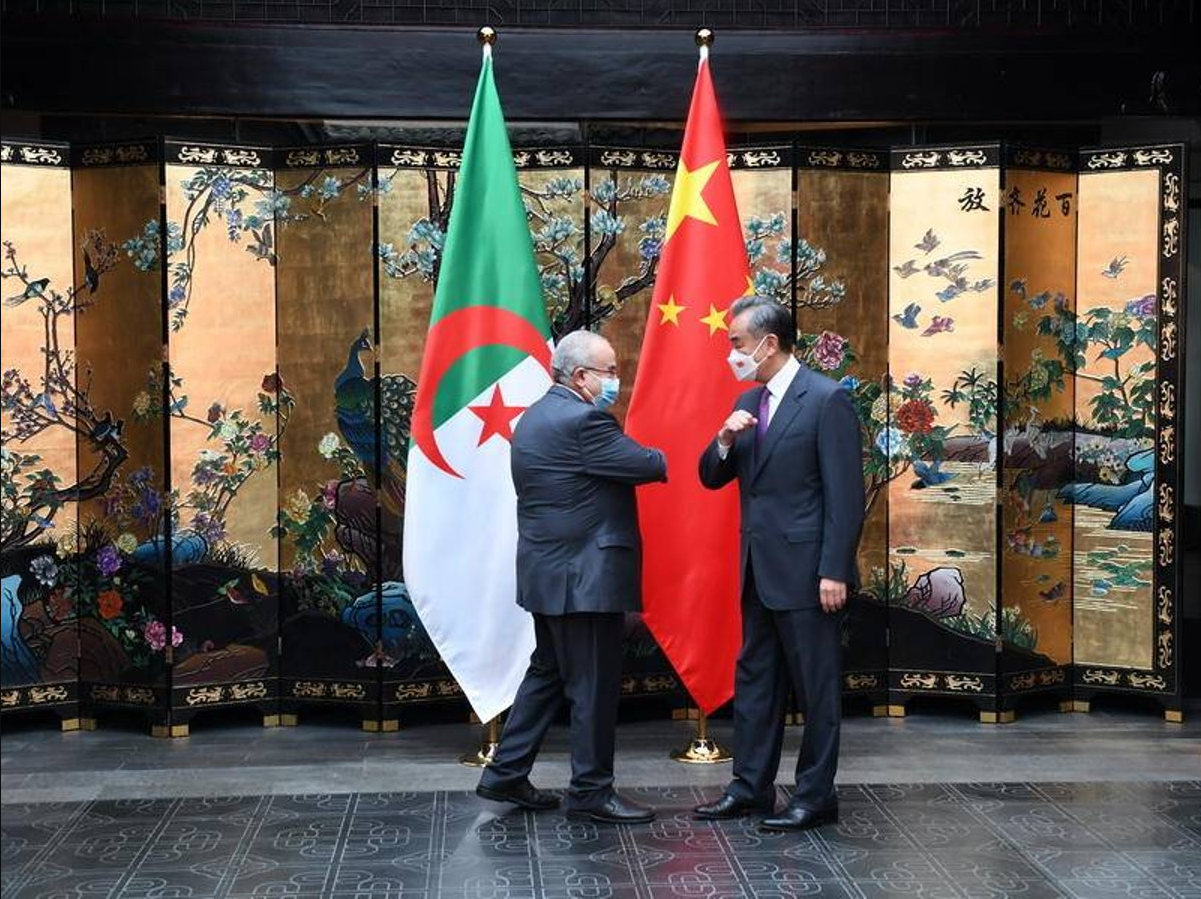China is seeking to enhance its presence in the Maghreb region by strengthening economic ties within the framework of the Belt and Road Initiative, expanding the scope of investments and strategic ties. China’s interest is driven by the strategic location of the Maghreb countries on the Mediterranean and the Atlantic Ocean, both of which are important to Beijing. In this context, China signed a memorandum of understanding with Mauritania on May 17th to send a Chinese medical mission to Nouakchott for a period of seven years. On May 28th, Chinese company Sinopec concluded an agreement with Algerian company Sonatrach in the petrochemicals sector worth USD 490 million.
As part of its endeavor to enhance its role in the Maghreb and to compete with American and European influence there, China has adopted the same strategy on which it has relied to support its presence in the Middle East and around the world. Its most prominent mechanisms are as follows:
Signing strategic cooperation agreements: China has strengthened its presence in the Maghreb region on the multilateral level through the China-Arab States Cooperation Forum and the Forum on China-Africa Cooperation, as well as bilaterally by signing two strategic partnerships with Algeria in 2014 and Morocco in 2016. The partnership with Algeria marked the first comprehensive strategic partnership between Beijing an Arab country. Beijing has yet to establish an official partnership with Tunisia and Libya, in light of the escalating political and security crises there, as well as Mauritania, which presents limited opportunities for China, due to its strong economic relations with the United States and France. In a bid to integrate some Maghreb countries into the Belt and Road Initiative, China concluded an agreement with Morocco on January 6th, requiring Beijing encourage major Chinese companies to invest in various sectors in Morocco, including the automotive industry, aviation, high-tech, e-commerce, and others. Algeria had joined the initiative in 2018, and the two countries announced, during Minister of Foreign Affairs Ramtane Lamamra’s visit to Beijing on March 20th, consensus on the “executive plan for the joint construction of the Belt and Road Initiative”, which will be signed as soon as possible. Although Tunisia joined the initiative in 2018, successive governments have been unable to make progress in implementing the initiative, according to statements by the Vice-President of the Tunisian Chinese Business Council, Doha Mizouni Chtoro, on January 2nd.
Establishing energy projects: Due to the rise in energy prices resulting from the Russia-Ukraine war, which has negatively impacted the Chinese economy dependent on energy imports, Beijing has turned to Maghreb countries that possess high energy reserves to secure its needs. Algerian oil and gas company Sonatrach – which at the start of the year announced investments worth USD 40 billion dollars between 2022 and 2026 for oil exploration, production and refining, as well as gas exploration and extraction – signed an agreement with China Sinopec for the purpose of joint production of oil at a site in southeastern Algeria, valued at USD 490 million. The duration of the agreement, according to the CEO of the Algerian company, Taoufik Hakkar, is 25 years, and the project is expected to produce a total of 95 million barrels of crude oil reserves. On May 19th, the Algerian company announced that it had awarded China a USD 20 million contract to build a plant for methyl tertiary butyl ether, a chemical compound added to car fuels to improve performance and quality instead of lead compounds.
Adopting “debt diplomacy” with Mauritania: China uses its financial capabilities to enhance its economic influence in developing countries through what has become known in Western literature as “Chinese debt diplomacy.” In a bid to strengthen ties with Mauritania, on January 25th Beijing canceled part of Mauritania’s debts, amounting to EUR 22.3 million. After Mauritanian Minister of Petroleum and Energy Abdeslam Ould Mohamed Saleh announced on March 4th that the country will start producing the first batch of liquefied natural gas in November or December of 2023, China is expected to raise the level of economic relations and partnerships with Mauritania.
Pursuing a neutral policy in Libya: China’s role in Libya is usually overlooked, although it has worked, despite instability in the country, to consolidate its influence as a major trade ally. China has been particularly interested in the oil sector, which is the most attractive field in Libya and one of Beijing’s main objectives. Even at the height of military confrontations between Libyan factions, Sinopec was one of the major oil companies operating in Libya. In the wake of the fall of the regime of President Muammar Gaddafi, China adopted a policy of cautious neutrality and diplomatic and economic diversification, and unlike other international powers, has not been involved in the military conflict. This policy is aimed at enabling Beijing to promote its interests, now and in the future, regardless of which faction comes to power. China can also play an important role in the process of rebuilding and redeveloping Libya through providing financial and technical support.
Raising the level of trade with the countries of the region: The scope of bilateral relations between China and the countries of the Maghreb has recently expanded. For example, bilateral trade between Morocco and China has grown in the past five years from USD 4 billion in 2016 to USD 6 billion in 2021. On January 5th, Moroccan Foreign Minister Nasser Bourita said that there are more than 80 Chinese investment projects being developed in Morocco, including port complexes and regional logistics centers. Trade between China and the five Maghreb countries reached nearly USD 23.5 billion in 2019. China’s investments and contracts in the Maghreb region between 2005 and 2019 amounted to nearly USD 29.6 billion.
Providing Covid-19 medical aid: China’s health diplomacy has always been an integral part of its strategy to strengthen its relations with its partners. It has used it to expand its influence in the Maghreb during the past two years with the spread of the Covid-19 pandemic, providing medical aid as well as large quantities of the Chinese vaccine . Algeria was the first African country to receive Chinese medical experts to help it confront the spread of the virus. Chinese medical assistance to the Maghreb has continued to help confront the pandemic, in addition to cooperating on manufacturing vaccines within the framework of the strategic partnership.
In recent years, China has worked to enhance its presence in the Middle East, with the Maghreb becoming a major target of Chinese diplomacy and investments. China has sought to enhance its relations with the region by presenting itself as a more reliable partner than the United States and European countries, and has prioritized trade relations over political influence in the Maghreb, a trend that is likely to continue in the coming period.


